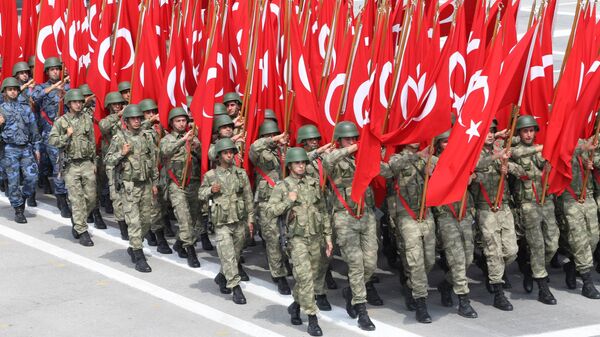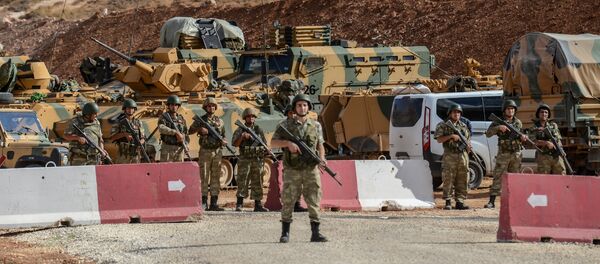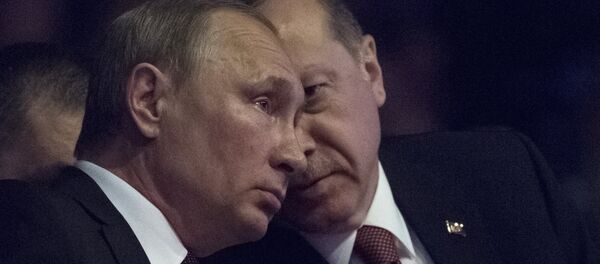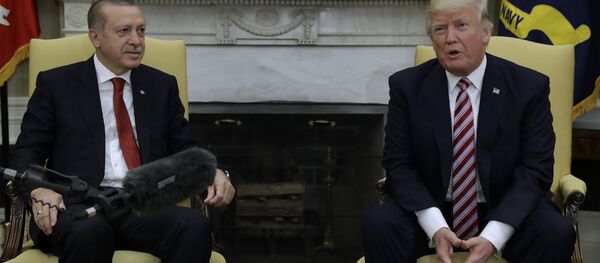Turkey's foreign policy has seen a dramatic U-Turn over the past few years, which as a result has led to Ankara's rapprochement with Moscow and Tehran.
During the Arab Spring, which started in 2010, the Turkish ruling Justice and Development Party (AKP) maintained allied relations with the US and Gulf monarchies. However, Russia's opposition to the attempted regime change in Syria, and its involvement in the conflict alongside Iran, changed the balance of power in the region.
How Russia's Air Campaign in Syria Influenced Turkish Foreign Strategy
"Russia's engagement with the Syrian process [in 2015] put [former AKP leader] Ahmet Davutoglu's foreign strategy to the test," Ahmet Kasim Han, political scientist at the Kadir Has University, told Sputnik Turkey, adding that Russia's actions in Syria "highlighted the weaknesses and flaws in Turkey's policy."
The countries' relations normalized in June 2016 after Turkish President Recep Tayyip Erdogan apologized for the incident. In August 2016, Russian President Vladimir Putin said that Russia would gradually lift the economic restrictions it had imposed on Turkey.
Still, Erdogan's decision to restore ties with Russia had not been primarily influenced by Moscow's sanctions, but by the need to balance Turkey's relations with the West, the academic believes.
Simultaneously, Ankara, which earlier demanded that Syria's legitimate President Bashar al-Assad stepped down, considerably softened its stance toward Damascus.
"Turkey changed its [foreign] policy because of Russia's influence, but this is not the only reason," Hasan Kanbolat, the founder and director of Ankara Policy Center (APM) told Sputnik. "Turkey realized that it knew little not only about the countries of the Middle East, but also about Syria."
Davutoglu believed that the Syrian issue would be resolved in 3 or 6 months, but he was proved wrong, the Turkish scholar highlighted, adding that Turkey's previous foreign strategy turned out to be ineffective.
Turkey and Iran Have Much in Common
For his part, political scientist Baris Doster of Marmara University believes that Turkey's decision to turn to Russia following the Su-24 incident paved the way for Ankara's "joining the Russo-Iranian axis in Syria."
"Turkey had made a lot of mistakes in its Middle East policy, and only after that it began seeking ways for rapprochement with Iran and started building bridges with the Iraqi authorities," Doster told Sputnik.
Doster surmised that the US is the major "mastermind" behind the Iraqi Kurdistan project, adding that the other backer of the Kurdish independence is Israel, Washington's longstanding ally in the Middle East.
Iraq, Syria, Turkey and Iran need to team up in the face of the separatism threat, no matter how deep the contradictions simmering between the countries are, the Turkish political scientist underscored.
On September 25 the independence referendum took place in Iraqi Kurdistan with more than 90 percent of voters backing the region's independence from Baghdad. Iraqi authorities declared the referendum illegal, while Turkey and Iran criticized the Kurdish voted.
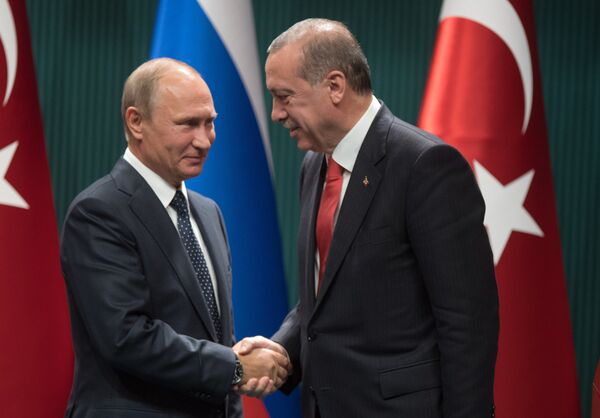
Most 'Threats Coming From the West' But Turkey Not Leaving NATO
At the same time, Doster emphasized growing tensions in relations between Turkey and Western countries: the US and EU do not regard Ankara as an equal partner and exercise a double standard approach toward Turkey.
However, although Ankara has been using anti-Western rhetoric in the past five years, Turkey's eventual breakup with NATO member states is unlikely, due to their longstanding historic and economic ties, the scholar believes.
"It doesn't appear possible that Turkey would exit NATO overnight and become a full member of the Shanghai Cooperation Organization (SCO)," Doster said. "Under current conditions, we are not talking about Turkey's withdrawal from NATO."
Kanbolat echoed Doster, stressing that over the past 20 years Turkey has made a dramatic technological leap, which allowed it to transform from an "underdeveloped" country to a "developed" one. That might prompt Ankara to reconsider its relations with the US and EU.
"Turkey is no longer looking helpless in the eyes of the West, its strength has increased," the scholar said. "This situation forces the West to build relations with Turkey on the conditions of equality."
However, according to retired Lieutenant General Ismail Hakki Pekin, former chief of the Turkish General Staff Intelligence Department, one shouldn't forget that Ankara's previous erroneous foreign policy was dictated by the West.
"Of course, it should be noted that we have not completely cut off relations with the West yet, but the fact that a significant portion of threats to Turkey come from the West, has pushed Turkey to cooperate with its neighbors," the former intelligence chief said.
Furthermore, Washington is still refusing to extradite Fethullah Gulen, the founder of the Gulen movement (FETO) and the alleged mastermind behind the coup attempt in 2016.
The Turkey-Russia-Iran Axis is Basis for Further Cooperation
According to Pekin, if Ankara continues to maintain relations with the West, they will develop within the framework of the Turkey-Russia-Iran axis.
"The current conditions are pushing Turkey to cooperate with Iran, Russia, and the countries of the region," he said. "This is a very important moment, and Turkey, which trusted NATO and got burned on it, saw that Russia and regional players should not be opposed, that it is necessary to… establish new alliances and adhere to this [new] foreign strategy."
The former intelligence chief believes that relations between Turkey, Russia, and Iran will continue to evolve: "Although the emergence of this axis was caused by temporary circumstances, I think that it will grow into a long-term cooperation."
The Russian-Turkish-Iranian Astana format has proven highly efficient. A series of negotiations on the Syrian crisis which were kicked off in December 2016 in Kazakhstan's capital have resulted in the implementation of the prolonged truce in Syria and creation of four de-escalation zones in the country.
The Astana talks, along with Geneva, have become one of the major global platforms for negotiations on the settlement of the conflict.

